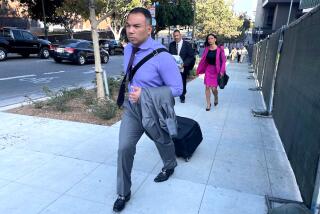Perjury Case Dropped Against Man Accused in Camarena Plot
- Share via
A federal judge in Los Angeles on Tuesday dismissed perjury charges against a prominent Mexican businessman, who still faces trial on accusations that he helped plan the 1985 murder of U.S. drug agent Enrique Camarena.
U.S. District Judge Robert M. Takasugi dismissed the government’s three-count perjury indictment against Ruben Zuno Arce, 59, after a brief hearing.
Takasugi denied a request from Assistant U.S. Atty. Adam B. Schiff for more time to present witnesses who would describe Zuno’s alleged motive for perjuring himself before a federal grand jury that investigated the Camarena murder here last summer.
Zuno is the brother-in-law of former Mexican President Luis Echeverria, and his father was once the governor of the Mexican state of Jalisco.
He was indicted last September for perjuring himself when he told the grand jury that he did not know either Rafael Caro Quintero or Ernesto Fonseca Carrillo, two Mexican drug kingpins who were in a Mexican jail on charges of murdering Camarena in Guadalajara in February, 1985. They subsequently were convicted and received long sentences in Mexico while separate charges stemming from the Camarena case are pending against them here.
Zuno’s perjury trial was scheduled to begin Jan. 30, but prosecutors wanted to have it postponed until after his Feb. 20 trial on more serious charges. In that case, Zuno is accused of having “organized and put into operation a scheme to kidnap and murder Camarena.” If convicted, he faces life in prison.
Schiff said he sought the continuance because he believed witnesses were in danger and so they would not have to come to Los Angeles to testify. Schiff also said that, if Zuno is convicted in the conspiracy case, it is likely prosecutors will not bring the perjury case to trial.
Edward M. Medvene, Zuno’s chief defense counsel, was unwilling to agree to a continuance, and the judge would not grant one. Then Schiff said he had been authorized by his superiors to ask Takasugi to dismiss the perjury case without prejudice, meaning that the government could refile the charges later. Takasugi granted that motion.
Zuno’s lawyers were pleased with the dismissal.
“We believe that the government dismissal of the perjury case is a reaffirmation of what we’ve said since . . . they took him into custody--the government doesn’t have a case,” Medvene said.
“This is a very important victory for Mr. Zuno,” said James J. Blancarte, one of his other defense lawyers. “Simple logic dictates if they don’t have the evidence to convict him on perjury charges (that he knew Fonseca and Caro), then they don’t have the evidence to convict him on charges that he conspired with Fonseca and Caro to kill Camarena.”
Asked if it was possible that prosecutors had dropped the perjury charges so that they would not have to show their hand in advance of the more significant conspiracy case, Blancarte responded: “It’s possible, but it stands side by side with the possibility that they don’t have a case.”
Medvene said that the government attempted to keep Zuno jailed to compel him “to supply information he doesn’t have,” a reference to the possibility that he could implicate others in Camarena’s murder.
The dismissal of perjury charges will have no impact on Zuno’s conspiracy trial, according to Assistant U.S. Atty. Manuel Medrano, the lead prosecutor in that case.
Zuno is the 16th person indicted in the Camarena case, a matter of the highest concern to the U.S. Drug Enforcement Administration and recently the subject of an NBC TV miniseries.
DEA agents have said there will be more indictments in the case by Feb. 7, the fifth anniversary of the murder and the last day on which charges can be filed before the federal statute of limitations runs out.
More to Read
Sign up for Essential California
The most important California stories and recommendations in your inbox every morning.
You may occasionally receive promotional content from the Los Angeles Times.









